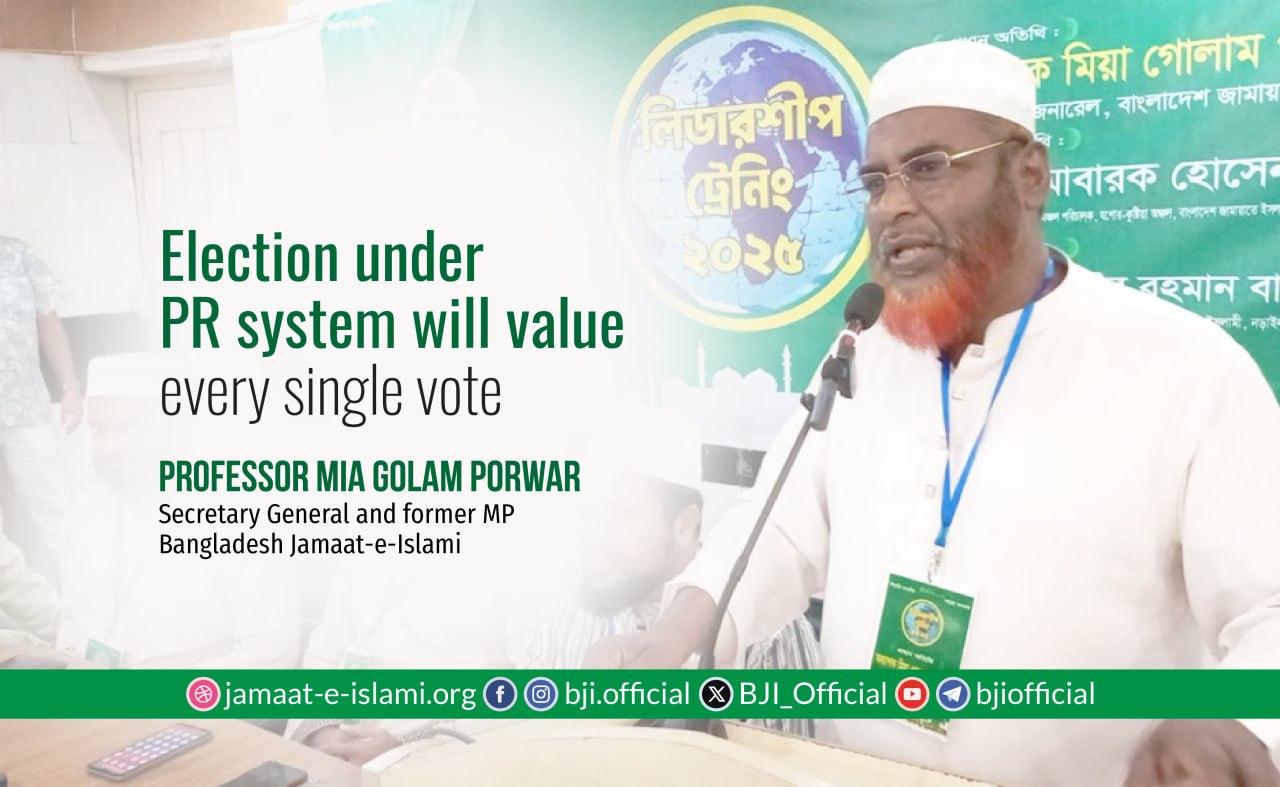Secretary General of Bangladesh Jamaat-e-Islami and former Member of Parliament Professor Mia Golam Porwar said, “In 91 countries around the world, the PR (Proportional Representation) system is in practice. PR itself has six different systems. We have said that the method which is suitable and applicable for Bangladesh’s political context and the socio-economic reality of the people must be introduced here. But the main concept is that, in this system, the candidates are not individuals, but political parties. Voters cast their votes based on the ideology, character, and the vision of the political party on how they will govern and build the country if they win the election.
This method has three to four benefits. In this system, votes are sought for the party, not for an individual. As a result, party interests outweigh personal interests. Black money, muscle power, and the trading of nominations come to an end. If a party secures even one percent of the total votes cast, that means they will receive one percent of the 300 parliamentary seats—thus, three seats. If a party gets 30 percent of the vote, that party will receive 90 seats. Seats are distributed among parties in this way.
Before the election, each participating party will submit to the Election Commission a list of 300 candidates. If a party wins 30 seats, the first 30 names on that list will be declared Members of Parliament. Thus, there will be no scope for personal gain—only party interest remains. The corrupt practices of black money, muscle power, and nomination trade will be eliminated. Every voter’s ballot will be valued.
In the current system, if the candidate a voter supports does not win, the voter feels his vote is wasted. But in the PR system, no vote is wasted; every vote counts. Small parties’ representation is also ensured. This system is called PR.”
On the morning of Saturday, August 16, he made these remarks while addressing as the Chief Guest at a “Leadership Training” program, organized by the Narail District Bangladesh Jamaat-e-Islami at the District Council Auditorium. The program was presided over by District Ameer Ataur Rahman Bacchu and hosted by District Secretary Maulana Obaidullah Kaiser. Special guests included Jamaat’s Central Executive Council Member and coordinator of the Jessore–Kushtia Region of Jamaat-e-Islami Mobarak Hossain, and Regional Team Member Maulana Ashek Elahi.
Secretary General further said: “There is another benefit of the PR system—it creates a quality parliament. Parties include highly educated, competent, and experienced individuals at the top of their candidate lists. Thus, the National Parliament will consist of capable and experienced members. This way, a rich and efficient parliament is formed, which can contribute to shaping the future of the nation.”
He said:“BNP may remain rigid; we too are firm in our stance. We must have PR. Some people say, ‘What if PR is not given?’ When it is not given, we will talk about it then. One BNP leader said, ‘People of this country do not understand EVM, nor do they understand PR.’ In response, Professor Porwar said, ‘This is a strange statement. EVM is the name of a machine; it is merely a method of casting votes. PR, on the other hand, is an election system. Comparing PR to a machine is incorrect. That is why we say, it does not matter who remains rigid or not—we have raised our just demand.
Special guest Mr. Mobarak Hossain said: “Those involved in election work must be trained. They must take care of their health. All tasks must be carried out properly with reliance on Allah. They must acquire leadership qualities. That is why this workshop has been organized.”
He further said: “Whenever the national election is held, Jamaat-e-Islami candidates must spend more time in the field. They must reach every voter. Candidates must mingle with people in such a way that every voter—men and women, young and old—can recognize them by name.”
Among others present were: Narail District Nayeb-e-Ameer Zakir Hossain Biswas, Assistant Secretary Ayub Hossain Khan, Abdus Samad, Abul Bashar, District Working Council members Maulana Alamgir Hossain, Hemayetul Haque Himu, Jamirul Haque Tutul, Khiyam Uddin, Dr. Abdus Sobhan, and many others.
